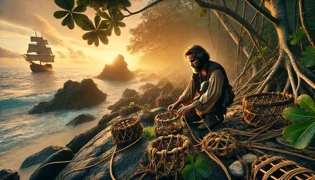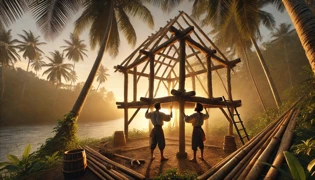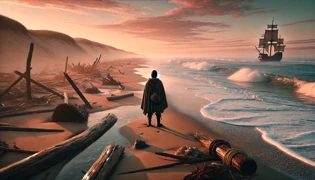Introduction
When the storm finally subsided, a rising sun spilled molten gold across a stretch of white sand strewn with fragments of timber, torn sails, and scattered crates. Robinson Crusoe, blinking against salt-sprayed lashes, lay prostrate in the surf, his clothes heavy with seawater and his body trembling from the force of the gale. He rose unsteadily to his feet, each step a testament to will, and surveyed the wreckage that had cast him upon this uncharted coast. Here, far beyond the reach of familiar harbors and the steady charts of commerce, he found himself utterly alone. Every instinct rebelled at the thought, every memory of hearth and family spurring him to cling to life. The wreck lay silent behind him, half-buried by shifting sand, its broken planks pointing like skeletal fingers toward the endless horizon. Ahead, dense palms and tangled undergrowth hinted at dangers and resources in equal measure. Crusoe’s heart pounded as he realized that survival would demand ingenuity, courage, and an unyielding spirit. No longer was he merely a castaway—he must become architect, hunter, carpenter, and chronicler of his own fate. With trembling hands he gathered tools tossed ashore—an ax, a knife, a pot dented by the waves—and crept into the shadowed fringe of jungle. The warm air, thick with the scent of salt and damp earth, pressed upon his lungs like a new world awakening around him. With each breath he steeled himself: he would endure. He would thrive. He would find his place here, among birds and beasts and the endless whisper of palm fronds in the dawn wind.
First Dawn on the Shore
From the moment Robinson Crusoe stepped beyond the water’s edge, every sensation felt electric with possibility and dread. His bare feet sank into hot sand as he surveyed the island’s fringe, where coconut palms swayed in a gentle breeze and vines crept toward the sea like curious fingers. The wrecked hull of his ship lay half-buried behind him, each plank a reminder of nature’s unpredictable fury. Gathering courage, he advanced into the undergrowth, hackles raised at every unfamiliar sound: a rustle of leaves, the cry of distant birds, the scuttle of unseen creatures in the brush. Sunlight filtering through the canopy painted the forest floor in shifting patterns of green and gold, casting dappled light on clusters of bright flowers and spiny ferns. He stopped at a slow-moving creek, its cool water clear and inviting, and knelt to drink. With trembling hands he filled his dented pot, questioning whether this island would nourish him or become his tomb. Over the next hours, Crusoe mapped a rough path along the shore, finding signs of life: mangrove roots exposing tangled habitats, crab burrows marking the sand with neat holes, and the footprints of birds bobbing near the tide line. He wrapped a length of rope around a broken mast as a marker and forced himself to inspect every wooded gap for sources of fruit or fresh water. At dusk, waves lapped in gentle rhythm and the island’s nocturnal chorus—frogs, insects, owls—rose in a single, natural choir. As darkness gathered, Crusoe realized he needed shelter. He felled a young palm with his salvaged hatchet, trimmed away its fronds, and wedged its trunk against an outcropping of granite. Over the next hours he wove the fronds into a lean-to that would keep off rain and dew. By the time he lay down, exhaustion clung to him like a second skin, and he drifted into a sleep broken by dreams of home, storms, and the unknown challenges waiting with dawn.

Crusoe awoke to a spear of sunlight warming his face. The shelter held firm, and for a moment he exulted in his small victory. He spent the morning experimenting with trap designs, using rope and sharpened wood to snare crabs and lizards. Each catch brought a surge of triumph; each misstep, like a snap of a twig, a lesson in patience. He stowed his modest supplies—salted meat, biscuits—inside a hollow log, cursing the sea that had claimed so much. Across the bay, he glimpsed a rocky promontory crowned with palms and promised himself he would climb it, to survey the island’s full contours and choose a long-term campsite. Despite the novelty and thrill of discovery, an unbidden loneliness tugged at his heart. In silence broken only by wind and wave, he whispered the names of family and friends, willing their voices to cross the empty miles that separated him from the world he had known.
By midday he had stacked firewood and coaxed a spark to life by striking flint against metal. Flames licked at dry grass, sending smoke spiraling skyward like a signal to unseen sailors. For hours he tended the fire, grilling small fish he caught in tidal pools and boiling water until it steamed clear of impurities. As evening approached, he discovered the taste of triumph in every peeled fruit and tasted resilience in every drop of water. Under the simmering glow of embers, Crusoe resolved to record his experiences: each day’s discoveries, each failure and triumph, would be inked into his battered journal. In preserving a record, he believed he preserved a tether to civilization, a proof of his existence should rescue ever arrive.
Night brought new challenges. Strange calls echoed from the jungle depths—monkeys, wild pigs, perhaps something ominous. Shadows danced at the edge of his firelight, and every snapping twig set his pulse racing. He stood guard until exhaustion reclaimed him, his hands wrapped tightly around his knife, every sense alert. But the island, for all its wildness, offered no immediate threat, and as the moon rose silver and serene, Crusoe allowed himself a moment of wonder. He was alive, here at the edge of the known world, and every breath felt like a gift from fate.
When dawn broke again, sharper and more determined, Crusoe climbed the promontory he had eyed from below. The vantage point revealed a panorama of emerald jungle stretching to distant hills, a network of streams winding toward hidden beaches, and a sky untouched by the smoke of cities. In that moment, he understood that this island—strange, dangerous, and beautiful—would become his destiny. He would tame its wildness, forge a life from its raw materials, and find in solitude a strength he never knew he possessed.
Trials of Sustenance
Survival demanded more than shelter. Crusoe soon realized the island’s riches were hidden behind patience and ingenuity. He began mapping fresh water sources—rivers, streams, even hidden springs where roots had cracked the earth. With a sharpened stake he dug a shallow well near the shelter, collecting trickles of underground water filtered through sand and stone. Each gulp revitalized him more than the last, stoking a newfound confidence. The forest floor offered more than water: nuts and fruits ripened in secret clearings, their flavors as alien as the landscape. Crusoe learned to distinguish the sweet kernel of breadfruit from its bitter kin, to shake coconuts free of their husks, and to locate clusters of wild mango clinging to knotted vines. But finding solid protein proved a greater challenge. Early traps lay empty, and attempts to spear fish in the reef left him soaked and empty-handed.

Refusing to yield, Crusoe spent days studying the patterns of crabs as they emerged at dusk to feed on seaweed. He devised a hollowed log trap baited with scraps of fruit and meat, angled so that once a crab entered, escape became impossible. Within hours he had enough for a modest feast, his heart soaring at the taste of success. He salted and smoked his catch over a low fire, then stored the cured meat in the hollow log, preserving a cache for leaner days. Each preserved bite tasted of ingenuity, each ration a reminder of survival’s delicate balance.
Emboldened by these victories, Crusoe turned to the island’s inland game. With rope scraped from ship’s rigging, he fashioned snare traps for wild pigs that roamed the forest’s edge. He set the traps along animal trails, covering them with leaves and brambles. The first pig he ensnared tested his resolve: its fierce squeals echoed through the grove, and for a moment, he hesitated between mercy and necessity. He steeled himself, delivering a swift blow that ended its life. That night, the roasted meat provided nourishment and a meditation on the fine line between hunter and hunted. He vowed never to take life without respect or thought.
As weeks passed, Crusoe’s routine solidified. Each dawn he foraged for food, studied weather patterns, and improved his traps. Each dusk he bolstered his shelter, tended his fire, and recorded the day’s lessons. The island shifted from a place of fear to one of fascination—a living classroom where every plant and creature offered new instruction. Solitude, once a burden, became a forge for his character. He spoke aloud to the sky, to the birds, even to a carved wooden figure he sculpted from driftwood, seeking to ward off madness.
Yet even in this steadfast rhythm, uncertainty lingered. Would rescue ever come, or had the world forgotten him? When storms rolled in, he clutched his chest and prayed for endurance. When the sun scorched the land, he knelt by the creek and thanked providence for cool refuge. The trials of sustenance tested his body and spirit in equal measure—yet with each victory, Crusoe felt the spark of hope grow brighter.
An Unexpected Ally
Months wore on, and the island ceased to feel entirely empty. Crusoe filled his days with purpose and his nights with the glow of a steady fire. One dawn, while walking the shore, he stumbled upon a cluster of footprints in the wet sand—unequivocally human and markedly different from his own. His heart thundered as he scanned the horizon, searching for a sail or a signal of another castaway. Hours passed without answer, and he returned to his shelter haunted by the possibility of companionship and equally by the fear of intrusion.

Over the next days he set signs: crosses carved into bark, piles of stones arranged at intervals, fires lit on hilltops at dawn and dusk. Each action spoke a silent plea across the wilderness: “I am here. Are you there?” Weeks could have passed before the answer finally came. One evening, at the edge of the jungle, Crusoe heard urgent whispers and saw two figures hiding behind palms. His pulse spiked, but instead of hostility, he beheld frightened eyes and trembling forms. The newcomers—noble Savages, as he later called them—kneeled before him, hands raised in cautious greeting. Their speech was strange to his ear, but their gestures spoke volumes. They brought fruits and fish as offerings, and in return he shared dried meat and boiled yams. Slowly, with broken words and gestures, Crusoe learned that one of the pair was called Friday. A bond formed through shared vulnerability and mutual respect.
With each passing day, Friday proved resourceful and faithful. He guided Crusoe to new water sources, taught him subtleties of island flora, and showed him how to fish using simple reeds. Around the hearth they exchanged stories: Crusoe of distant England, of storms and commerce; Friday of tribal rites, of the rhythms of jungle life. Through broken phrases and patient gestures, they founded a friendship that transcended language. Where Crusoe had once prayed for rescue, he now found comfort in another’s company. He taught Friday to write his name in the sand, to make simple maps, and to share in the rituals of camp life. Friday, in turn, taught Crusoe to move silently among the palms and to listen for signs of rain.
Their alliance transformed the island. Together they built a sturdier house of wood and stone near the freshwater creek, complete with a split log table and benches. They fashioned pottery from clay, storing water and grains in hollowed gourds. They lit signal fires on the bluff each morning, their smoke rising like twin beacons visible to passing ships on the trade routes. Each structure and routine bore the imprint of unity, the joint labor of two men forging order from wilderness.
Though rescue remained uncertain, hope no longer felt like a distant dream. Crusoe and Friday reveled in shared meals, laughter at mispronounced words, and a deep gratitude for each other’s presence. The island’s solitude had given way to a community born of necessity, respect, and kindness. In Friday’s friendship, Crusoe recognized the greatest discovery of all: that even in isolation, the human spirit finds its most profound strength in companionship.
Conclusion
Years passed in a tapestry woven from daily hardships, triumphs, and evolving dreams. Robinson Crusoe, once a lone castaway adrift in despair, had transformed this remote island into a realm of purpose and hope. He had felled trees, built shelter, mastered the art of fishing and trapping, and recorded every lesson in his tattered journal. But the greatest measure of his survival was not the sturdiness of his walls nor the richness of his harvest; it was the depth of his human spirit. In forging a bond with Friday, he discovered that resilience finds its clearest expression in companionship, that two hearts kindled by trust can turn isolation into fellowship. Though sails on the horizon eventually signaled rescue and the promise of a return to civilization, Crusoe felt a quiet sorrow at leaving the land that had tested and shaped him. He departed with a renewed faith in life’s possibilities, carrying with him the knowledge that, no matter how fierce the storm or remote the shore, perseverance, ingenuity, and friendship can light the darkest path. His story endures as a testament to the unbreakable will of the human heart, ever willing to conquer fear, celebrate small victories, and believe—from the depths of solitude—that hope always remains just beyond the next ridge, the next sunrise, the next shared smile between friends.



















